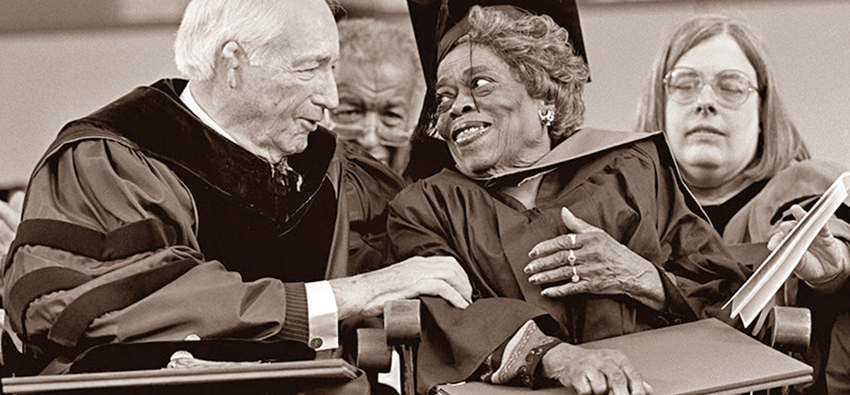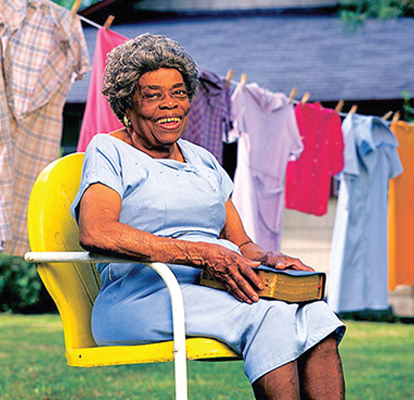A Laundry Woman Gets an Honorary Doctorate

“Sometimes those who give the most are the ones with the least to spare.”
- Mike McIntyre, in The Kindness of Strangers
"I am proud that I worked hard and that my money will help young people who worked hard to deserve it. I’m proud that I am leaving something positive in this world My only regret is that I didn’t have more to give" Unsung heroes"
The story of the life of Oseola McCarty, an African American woman is indeed amazing. Born into poverty, she left school in the sixth grade; she grew up in a tiny house that she never left except to go up the street to buy groceries and to visit the church. Incredible as it may sound, she was conceived when her mother was raped on a wooded path in rural Mississippi, as she returned from tending a sick relative. At the age of five, Oseola moved to Hattiesburg, Mississippi with her grandmother and aunt. She made her living washing other people’s dirty laundry, carefully saving the nickels and the dimes and the quarters that were offered to her in return. She never learned how to drive and she never got married although she did say in a lighter vein when she was in her late eighties that she was ‘still looking for a good man’. Oseola lived a simple, decent and frugal life, dutifully putting aside the money that she earned day after day, week after week, month after month as the decades slipped away. McCarty wanted to use her money to help others get what she had missed a good education. When her generosity became known, she was awarded the Presidential Citizens Medal at the White House.
At 87, Oseola McCarty had to quit working for health reasons. One day she walked into her A Laundry Woman Gets an Honorary Doctorate local bank and was greeted by a banker, who asked her whether she had an idea of how much she had accumulated as a result of these small daily contributions she had been making over the course of her life. When she indicated that she had no idea, he smiled and informed her that over one-quarter of a million dollars sat in her bank account. Sensing that Oseola had no concept of how much money that was, the banker took out ten dimes and placed them on the counter. “These ten dimes represent your money, Oseola. What will you do with them?” She pointed to the first dime and vowed to give it to the church. The next three dimes were reserved for her much-loved nieces and nephews. And then a lovely smile came to Oseola’s face as she said that the remaining dimes were to be used for something very special.
One month later, the University of Southern Mississippi in Oseola’s home-town received a cheque from her for $150,000, with a request that it be used to set up a scholarship fund to help poor students fulfil their dreams. When this news spread far and wide, over 600 men and women in Hattiesburg and beyond made donations that more than tripled her original endowment. This act of humanity touched the hearts of people around the world. Oseola was honoured by Presidents and Prime Ministers and even received an honorary doctorate from Harvard University. Through all the hoopla, she maintained that she still wanted to spend her life in a simple and principled way. But she confided that she never expected her dream to be realised, given her advanced age 94.
However, the day came when Oseola was given the honour to walk on to the stage to give away the scholarship. She couldn’t help the tears of joy rolling down her cheeks. After Oseola passed away, a reporter called that young scholarship winner and asked her for a comment on the death of her benefactor. The student offered this response. “Heaven couldn’t have gotten a better angel. She was an inspiration, a blessing, a treasure to the entire earth.”
"The basic principles she’d lived by throughout her working years continued to serve her well through her final years"
 Oseola McCarty
Oseola McCarty“Look at the life of Oseola McCarty; how she washed people’s dirty clothes to make ends meet. She lived in a tiny home and was unknown to the world. The backbreaking work that this woman and her female family members performed each day, as they made their own lye soap, washed heavy loads by hand, and pressed them with a flat iron is difficult to believe. And hers was not a standard-issue job. McCarty scrubbed her laundry by hand on a rub board. She did try an automatic washer and dryer in the 1960s, but found that 'the washing machine didn’t rinse enough, and the dryer turned the whites yellow'. After years of boiling clothes and then doing four fresh-water rinses, that wasn’t good enough to meet her high standards. The machine was almost immediately retired, and she went back to her Maid Rite Scrub Board, water drawn from a nearby fire hydrant, and 100 feet of open-air clothesline. And yet through her small daily acts of contribution saving those coins over all those years for a worthy cause she blessed the world. What a glorious legacy this woman left.”
She didn’t need fame to give her self-worth, contentment or happiness. But the masses longed to hear her wisdom. At age 86, she became a jet-setting celebrity, getting interviewed on ABC, CNN, NBC, BET and MTV. But fame never changed her. The basic principles she’d lived by throughout her working years continued to serve her well through her final years. Oseola McCarty had a strong and virtuous character and good habits. She lived frugally, walking almost everywhere, including more than a mile to get her groceries. I start each day on my knees, saying the Lord’s Prayer. Then I get busy about my work,” McCarty told to one interviewer.
Like a lot of philanthropists, Oseola McCarty knew that giving is its own pleasure. When a journalist from People magazine asked her why she didn’t spend the money she’d saved on her, she answered with a smile, “I am spending it on myself. I am proud that I worked hard and that my money will help young people who worked hard to deserve it. I’m proud that I am leaving something positive in this world. My only regret is that I didn’t have more to give.”
McCarty hoped to inspire others to similar acts. And she did. The famous cable TV Mogul, Ted Turner decided to donate a billion dollars to charity after hearing her story. He was quoted in the New York Times saying, “If that little woman can give away everything she has, then I can give a billion.”
Oseola McCarty knew she didn’t have to save the whole world. She summed up her philosophy in these words. “I can’t do everything. But I can do something to help somebody. And what I can do I will do.”